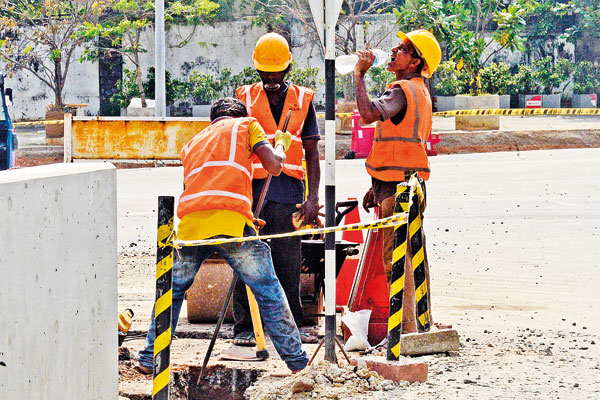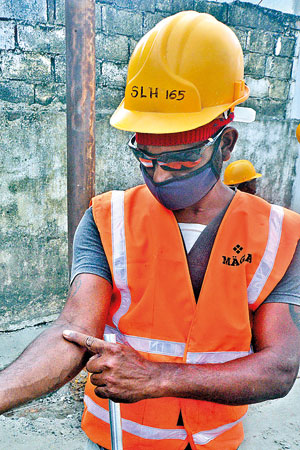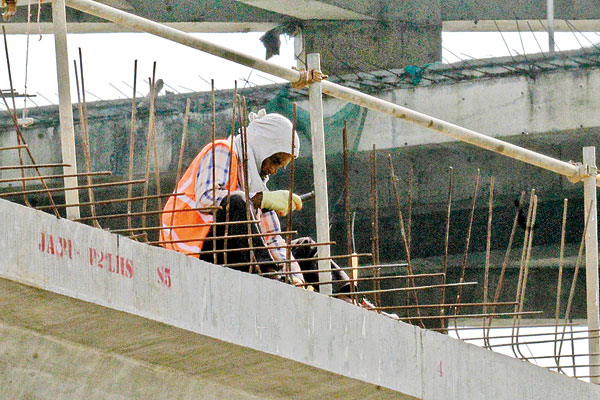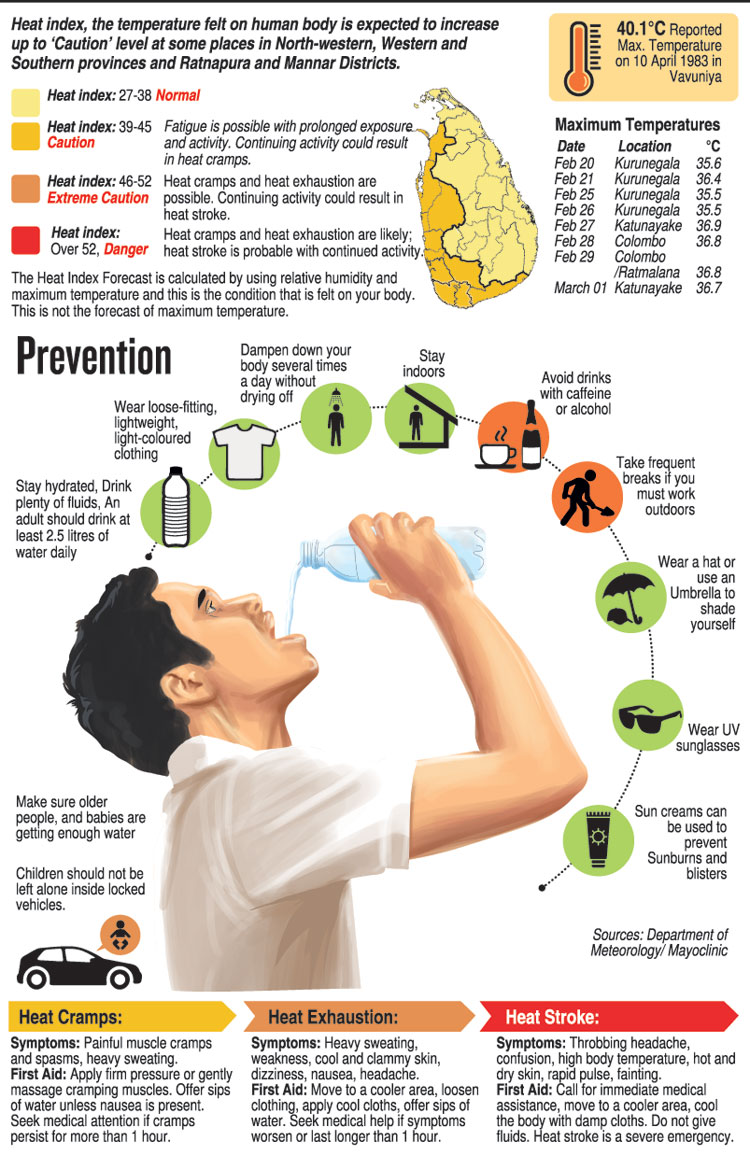News
El Niño charges up temperatures, causing illness
View(s):- Experts recommend avoidance of outdoor activities and intake of more water and fluids
By Nathara Abeywickrema
Annual athletic events and school cricket matches, could be expose vulnerable groups, including children, to the adverse effects of the severe heat.
Nutrition specialist Dr Renuka Jayatissa said that due to the high water content of the human body, dehydration can happen when the body tries to cool itself by sweating when the temperature rises.

 Dehydration poses a bigger risk to young people than to adults. Severe dehydration makes children lethargic during sports activities. She stressed that both mild and severe dehydration might result in rapid heartbeat and dizziness, which may lead to cardiac arrest.
Dehydration poses a bigger risk to young people than to adults. Severe dehydration makes children lethargic during sports activities. She stressed that both mild and severe dehydration might result in rapid heartbeat and dizziness, which may lead to cardiac arrest.
Alongside this, extreme heat can trigger a variety of heat stress conditions, such as heat stroke.
Applied Nutrition Professor Ananda Chandrasekara said, “Exposure to temperatures above average can cause rapid increases in body heat gain, which can impair the body’s capacity to regulate temperature and lead to hyperthermia.”
When the body’s core temperature begins to rise, three stages of hyperthermia occur: heat cramps, heat exhaustion, and heat stroke, with the latter being the most serious.
The combination of exposure, physical activity, and, in certain situations, wearing heat-trapping protection gear puts athletes at risk for heat illness, Dr Chandrasekara added.
“Athletes face the risk of dehydration. They may run low on water and electrolytes.”
He advised increasing the intake of water from 8 glasses a day to at least 12, and drinking other fluids such as coconut and king coconut water, oral rehydration salts (Jeevani), fresh juice, or sports drinks, in case of symptoms of dehydration.
Physicians are becoming increasingly concerned about the rise of skin diseases in children due to heatwaves.
Dr Deepal Perera, a consultant paediatrician at Lady Ridgeway Hospital for Children, said that extreme weather events pose a threat to the skin, regardless of age.
One might see itchy rashes, blisters, or mini-bumps, and clothes may exacerbate the discomfort from friction. He suggested that those who sweat a lot take a shower twice daily and also use antibacterial soap or gel to keep the skin dry. “Another way to assist in reducing inflammation is to apply ice cubes to the affected area.’’
He urged parents to remain vigilant and said children should be encouraged to wear light and loose-fitting clothes made of natural materials as much as possible. Children could experience miliaria, also known as prickly heat or sweat rash, during these warm months. They should not wear nylon undergarments that could harbour mycosis, also called fungal infections.

Many workers carry on in the heat. (Left) Construction crew member Sudarshan showing his sweat rashes. Pix by Eshan Fernando
To help children overcome the heat, Dr Perera suggested that schools should mandate lightweight clothing.
Schools have been told to provide drinking water facilities to students, have a fully stocked first aid room, and educate staff and students about heat-related illnesses and safety measures.
Dr Ananda Jayalal of the Health Promotion Bureau told the Sunday Times that heat might make someone feel as though they were unable to complete the tasks they had undertaken. To keep going when one feels like stopping is to risk a heat stroke, he said.
“Increase your vitamin C intake regularly, drink your fluids, wear a wide-brimmed hat or cap, and sunglasses, use an umbrella, maintain a healthy diet, and minimise screen time. For adults, it is recommended to avoid alcohol and caffeine, as both are diuretics that can cause the body to lose water,” Dr Jayalal said.
In scorching heat, many workers and employers may not be aware of the most effective way to handle the conditions.
The working hours of Upali Wijeratne, a construction worker, are from 7 am to 10 pm, and he handles many physical tasks.
“It is anticipated that the road construction will be finished in 40 days. Even if it is challenging to work during heatwaves, our working hours are set in stone, and there are no breaks other than for lunch,” Mr Wijeratne said.
Extreme heat has caused worker performance to decline, according to D Sudarshan, a member of the construction crew in charge of monitoring their work.
The majority of employees are developing sweat rashes, and in certain cases, dehydration and unexpected dizziness have resulted in numerous workers being rushed to the hospital.
As a result of this, each employer needs to do a risk assessment to help them ascertain the ideal temperature for their workplace and the controls that will be required to reach it, Dr Jayalal said. Employers may offer flexible working hours, he said.
Street sweeper Mohammed Amir said he has to work despite the intense heat.
The vice president of the All Island Agrarian Services Union, Susantha Kumara Nawaratne, said common repercussions of the heatwave include lower crop yields, more insect and disease pressure, and soil degradation. The demand for water will also rise, putting a strain on supply.
The extreme heat has also badly affected the self-employed.
Aravind Ravi, a tuk-tuk driver, said hires are hard to come by because people are not venturing out in the heat.
To stay hydrated, eat more fruit and vegetables with high water content, such as watermelon, cucumber, and local oranges. According to nutritionists, energy drinks might increase the risk of dehydration, probably due to their high caffeine content, potentially causing health concerns.
Meril Mendis, deputy director (weather forecasting and early warning) of the Department of Meteorology, explained the high heat is caused by the sun’s presence straight over Sri Lanka along with irregular and sporadic wind patterns.
These extreme temperatures, fuelled by the climate crisis, especially the onset of the El Niño phenomenon, where warm water from the Pacific Ocean flows towards South America, transfer significant ocean heat into the atmosphere, raising the surface temperatures.
The scorching weather is expected to last until mid-April, when the inter-monsoon season begins, the department predicts.

The best way to say that you found the home of your dreams is by finding it on Hitad.lk. We have listings for apartments for sale or rent in Sri Lanka, no matter what locale you're looking for! Whether you live in Colombo, Galle, Kandy, Matara, Jaffna and more - we've got them all!

